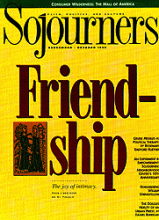The garden itself isn't so remarkable: some tomatoes, sweet peas, and greens growing amongst the lettuce, zucchini, and assorted flowers in a 30-foot by 30-foot plot. Earlier this year, however, the garden in front of University Avenue Homes in Berkeley, California, had a different look altogether: It was a parking lot.
Berkeley zoning regulations required that every inch of the property around the building had to be paved over for parking as the 75-unit building was refurbished for low-income housing--despite the fact that all but three of the formerly homeless residents didn't have cars.
Two months later, when it became clear that the excess parking was unneeded, the city gave permission to remove a section of the parking lot. People from the house joined others from the neighborhood and area environmentalists in tearing up the pavement and planting the garden.
In addition to the actual physical improvement for the residents, the "depaving" represented a "symbolic withdrawal from sprawl development," according to Richard Register, president of Ecocity Builders, which spearheaded the urban reclamation project. "People pave over hundreds of thousands of acres every year," Register said. "Every small step away is important."
Register, author of Ecocity Berkeley: Building Cities For a Healthy Future, asserts that such efforts point to a new direction in rebuilding ecologically healthy cities, oriented not around automobiles but connected instead by rail, bike, and foot traffic. "The city of the future," Register said, "will be much more compact, and more diverse, with jobs, services, shops, and housing closer together." The auto-free movement, Register said, is growing in this country and abroad.
Read the Full Article

